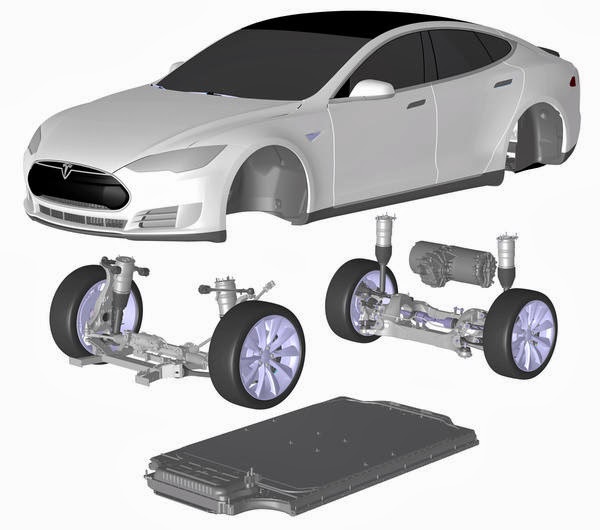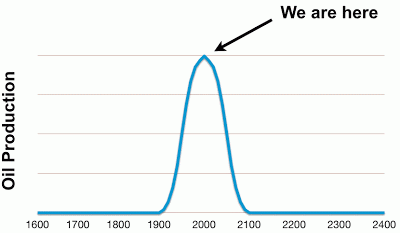Long-term trends are that electric vehicles will take over, and fossil fuel will be rendered obsolete. That’s according to a Bloomberg News report last week with good news for anyone rooting for the demise of the fossil fuel industry. It’s not government mandate, but technology improvements that will create this result, goosed along with a few government policies. There are several moving parts to this long-term trend, and it’ll be a few years before it really takes hold. Bottom line is that in a few years the basic economies of fossil fuel versus electric fuel vehicles will solidly favor electricity.
Let’s start with two trends, US domestic oil production and gasoline consumption

Domestic oil production peaked October 1970 at 10,013 thousand barrels per day, fell dramatically. Since 2005 it has climbed rapidly, thanks to fracking, to 9,185 thousand barrels per day in Jan 2015
The fracking boom in North Dakota and other shale formations around the U.S. has turned around the story of domestic oil production. Production has nearly doubled since 2005. President Obama, whose administration has done a lot to support clean energy technologies like electric cars, has been bragging about this oil production increase under his administration. So, how is this good for electric vehicles? It’s not, directly, but there are several other factors to consider.
This is another long-term trend. As rapidly as that production line just showed is rising, eventually the fracked fields will also run low on fossil fuels.
This trend is barely perceptible but looking carefully at the chart it’s clear that the long-term upward trend in gasoline consumption has leveled off. The peak was in August 2007 at 9,582 thousand barrels per day.
You may recall that in 2007-8 gasoline prices shot way up, causing many to anxiously look for more efficient vehicles. This was supposedly due to global political tensions, primarily in the Middle East, and its possible effect on global oil supply. Another, less recognized, effect is that in 2005-6 world oil production reached a peak point and began falling off. Meaning that the long term price for gasoline is going up, even if there are short term factors that might keep oil prices down.
It’s interesting that the other period where consumption fell off is the late 70’s following the two faux oil crises of that era. Those oil crises caused rising gasoline prices and a search for fuel efficient vehicles. But when Pres. Reagan was elected, the tone shifted, we forgot about high oil prices and oil crises, and went back to gas guzzling.
In any case, in the face of rapidly rising domestic oil production there has been a fall-off in oil consumption. That’s an interesting trend.
One would expect the rising oil production since 2005 would cause gasoline prices to drop, make us forget about high gasoline prices, and we’d go back to gas guzzling. But that’s not happening this time around.
The tightening of fuel efficiency standards is occurring around the world, and the U.S. has a goal of 54+ MPG average fuel efficiency by 2025. This chart is from the Obama Administration, and projects the difference in fuel consumption by heavy trucks thanks to those fuel efficiency improvements.
In other words, the long term trend is to decrease fossil fuel consumption in the vehicle fleet through energy efficiency improvements. In order that we continue enjoying vehicles of the sort we have today, that means electrified vehicles of one kind or another.
In the short term this trend of increasing fuel efficiency helps the overall goal of reducing fossil fuel consumption.
Another factor is the rapidly increasing sales of electric cars. Where sales of hybrid and plug-in hybrid cars reduce fossil fuel consumption per vehicle mile traveled – that is, higher miles per gallon means fewer gallons burned for the same miles traveled – electric cars simply don’t consume any fuel other than electricity. As electric vehicle sales increase the effect will be even more reduction of fossil fuel consumption.
A study in Nature, Rapidly falling costs of battery packs for electric vehicles![]() , published March 2015, says that prices automobile manufacturers pay for battery packs has fallen to about $300 per kiloWatt-hour. Further, the price is falling by 8% a year. Back in 2012 I reported on a McKinsey & Company quarterly report claiming that $250 per kiloWatt-hour is a “sweet spot” at which battery-electric vehicles become directly economically feasible.
, published March 2015, says that prices automobile manufacturers pay for battery packs has fallen to about $300 per kiloWatt-hour. Further, the price is falling by 8% a year. Back in 2012 I reported on a McKinsey & Company quarterly report claiming that $250 per kiloWatt-hour is a “sweet spot” at which battery-electric vehicles become directly economically feasible.
Back in 2013 the IEA Global EV Outlook![]() projected battery pack costs would fall to $300/kWh by 2020. If the Nature study is correct, that estimate has been beaten by 5 years.
projected battery pack costs would fall to $300/kWh by 2020. If the Nature study is correct, that estimate has been beaten by 5 years.
This is important because high battery pack prices increases the battery electric car purchase price which in turn limits electric car sales. Lower battery pack costs should decrease electric car purchase price and improve, making it easier and easier for car buyers to decide to choose electric.
It’s obvious that, today, a battery electric car costs more than an equivalent gasoline powered car![]() . But, various cost savings (including fuel cost savings) make up for that price premium over the lifetime of a battery electric car. Battery electric vehicles have a cost-of-ownership advantage over gasoline vehicles: Electricity is a far cheaper fuel than gasoline. Spend the same amount on gasoline or electricity, and you drive further on electricity. For those who drive a lot the fuel cost savings adds up.
. But, various cost savings (including fuel cost savings) make up for that price premium over the lifetime of a battery electric car. Battery electric vehicles have a cost-of-ownership advantage over gasoline vehicles: Electricity is a far cheaper fuel than gasoline. Spend the same amount on gasoline or electricity, and you drive further on electricity. For those who drive a lot the fuel cost savings adds up.
The higher purchase price (MSRP) for battery electric cars makes it harder to grok the cost savings advantage. But, as battery pack costs fall, electric car prices will fall, and in the due course of time perhaps they’ll be equal to gasoline car prices. At some point it’ll become obvious to everyone that electric cars are simply cheaper than gasoline cars.
The Bloomberg piece![]() claimed that these trends meant Big Oil is about to lose its monopoly over vehicle fuels. Well, they said, “about to lose control over the auto industry”. For over 100 years oil has monopolized transportation fuel. It’s possible that some in the auto industry want to free themselves of Big Oil. In about 2005, at a fuel cell vehicle test ride event in San Francisco, I overheard a car company guy give that exact explanation for developing fuel cell vehicles.
claimed that these trends meant Big Oil is about to lose its monopoly over vehicle fuels. Well, they said, “about to lose control over the auto industry”. For over 100 years oil has monopolized transportation fuel. It’s possible that some in the auto industry want to free themselves of Big Oil. In about 2005, at a fuel cell vehicle test ride event in San Francisco, I overheard a car company guy give that exact explanation for developing fuel cell vehicles.
- Is there enough Grid Capacity for Hydrogen Fuel Cell or Battery Electric cars? - April 23, 2023
- Is Tesla finagling to grab federal NEVI dollars for Supercharger network? - November 15, 2022
- Tesla announces the North American Charging Standard charging connector - November 11, 2022
- Lightning Motorcycles adopts Silicon battery, 5 minute charge time gives 135 miles range - November 9, 2022
- Tesla Autopilot under US Dept of Transportation scrutiny - June 13, 2022
- Spectacular CNG bus fire misrepresented as EV bus fire - April 21, 2022
- Moldova, Ukraine, Georgia, Russia, and the European Energy Crisis - December 21, 2021
- Li-Bridge leading the USA across lithium battery chasm - October 29, 2021
- USA increasing domestic lithium battery research and manufacturing - October 28, 2021
- Electrify America building USA/Canada-wide EV charging network - October 27, 2021


















